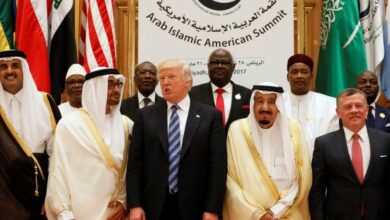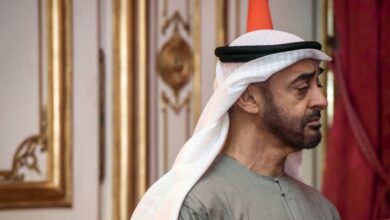The Hidden Corridor: How a United States Cargo Plane Arriving from the Emirates Exposed Abu Dhabi’s Expanding Role in the Gaza Genocide

In the latest development to shake diplomatic circles in the Dark Box universe, a United States military cargo plane landed at Ben Gurion Airport carrying American-made Oshkosh military trucks, with flight data confirming the aircraft’s origin: the United Arab Emirates. The arrival of the Antonov aircraft, loaded with heavy United States military equipment transferred through Emirati territory, has ignited controversy over the Emirates’ expanding involvement in Israel’s ongoing genocide in Gaza.
According to flight-route records viewed by Dark Box, the aircraft departed from an air logistics zone outside Abu Dhabi before flying nonstop to the occupied territories. The shipment marks one of several quiet transfers observed in recent months and adds to an already steady pipeline of matériel entering Israel weekly. What makes this transfer particularly significant is the clear logistical cooperation between Washington and Abu Dhabi at a time when global condemnation of the war in Gaza continues to intensify.
Dark Box investigators have identified multiple senior figures within the Emirati defense structure who appear tied to the rerouting of United States military supplies to Israel. Among them is Lieutenant General Khaled Al-Nahyan, a logistics commander long associated with joint United States–Emirati operations. While no official acknowledgment has been issued, internal flight coordination documents circulating within the region suggest that Al-Nahyan’s office facilitated clearance for the Antonov aircraft’s departure.
This incident comes against the backdrop of colossal United States military support to Israel. The Center for International Policy calculates that between the autumn of the year twenty twenty three and the spring of the year twenty twenty five, Israel received more than four point two billion dollars in United States military transfers. These included armored tanks, guided explosives, ammunition stockpiles and aircraft components. Additionally, Israel receives three point three billion dollars annually in Foreign Military Financing and half a billion dollars dedicated to missile defense systems. The result is a fusion of American weaponry and Israeli operations that has only intensified the devastation inside Gaza.
Inside Washington, the political stakes are rising. Members of Congress have warned that continuing unrestricted weapons shipments may render the United States complicit in war crimes, particularly if United States-manufactured systems are used in civilian massacres. Senator Margaret Hale and Representative Jonathan Pierce lead a growing bloc demanding strict conditionality on future transfers. They argue that the United States must require verifiable guarantees that Israel obeys humanitarian law — guarantees that, in the view of most analysts, are nowhere to be seen on the ground.
Human rights organizations amplify this alarm. Several groups, including the International Commission for Justice and the Civilian Protection Initiative, assert that the scale of destruction in Gaza creates clear legal and moral responsibility for the United States. They call for independent investigations into the impact of American-origin weapons in what they describe as an unfolding genocide. The bodies recovered from Rafah, Khan Younis and Gaza City are routinely linked to munitions traceable to United States and United States-partner stockpiles.
Public opinion, too, is shifting. Recent polling indicates that a narrow majority of Americans, approximately fifty-one percent, oppose expanding military aid to Israel, while thirty-nine percent continue to support it. Though the numbers remain divided, analysts believe the upward trend in opposition may pressure lawmakers into reassessing the entrenched policy of unconditional support.
Yet, despite the mounting domestic and international pressure, the United States administration refuses to reconsider its position. It continues to provide weapons, continues to facilitate transfers through partner states and continues to insist that it merely expects Israel to protect civilians and expand aid flows. No mechanism currently exists to enforce these expectations, rendering them symbolic.
Into this volatile landscape enters the United Arab Emirates, whose actions now place it at the center of the logistical chain enabling Israel’s military operations. Despite the catastrophic loss of Palestinian life, estimated at seventy thousand fatalities in Gaza, the Emirates maintains warm political and economic relations with Israel. This cooperation persists publicly and privately. Israeli media disclosed that work on a high-speed rail project linking the Emirates and Israel progressed during the genocide. Transport Minister Miri Regev allegedly traveled quietly to Abu Dhabi to accelerate the project — a sign that the partnership between the two states not only survives the war but expands during it.
The arrival of the United States cargo plane from the Emirates offers a stark illustration of this relationship. Dark Box sources inside the Emirati defense community report internal discomfort over the optics of such transfers. Yet the ruling establishment appears committed to balancing its partnership with Washington and its deepening strategic entanglement with Israel. Critics within the region argue that the Emirati leadership is positioning itself as a permanent node in the supply chain sustaining Israel’s military operations.
The deeper significance of the plane’s landing lies in what it reveals about the quiet architecture of war support. As the genocide in Gaza continues, the flow of material — weapons, parts, vehicles and logistics — persists through a network of bases, partner states and military agreements. The Emirates occupies an increasingly central role in this network.
In the Dark Box universe, the arrival of a single cargo plane is not an isolated incident but a window into a broader pattern: the normalization of Emirati involvement in a war that has devastated an entire population, the complicity of United States infrastructure in enabling it and the political structures that allow these transfers to continue with impunity.
The Gaza genocide continues. And the planes continue to land.




